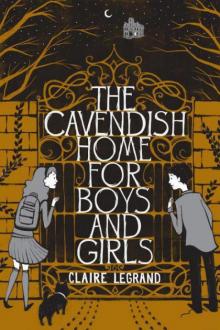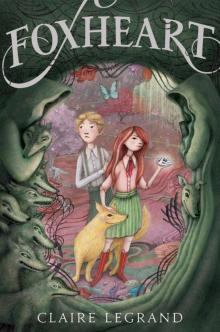- Home
- Claire Legrand
Foxheart
Foxheart Read online
DEDICATION
For my fellow Curators
Stefan, Kat, and Emma—
without whom Quicksilver would not exist
MAP
CONTENTS
Dedication
Map
1. Pigwitch Girl
2. The Wolves That Were Not Wolves at All
3. Gold and Swords and Cakes
4. A Name for a Thief
5. The Rules of Thieving
6. The Stranger
7. Three Guesses
8. White, Gray, Black, Brown, Gold, Blue, Red
9. The Monster’s Den
10. The Star Lands of Long Ago
11. Anastazia and the Wolf King
12. Some Sort of Witchy Thing
13. A Bit Rough around the Edges
14. A Monster Named Fox
15. The Little Hurts
16. A Cooperative Witchling
17. A Thousand Battles
18. Like a Piece of Night
19. The Rompus
20. On the Toasty Side of Things
21. The Thief Dagvendr and His Many Nearly Perilous Encounters with Death
22. A Tiny Bit Heartless
23. Too Late for Warnings
24. A Storm of Fur and Fangs
25. Mind Magic
26. Rats, Most Assuredly
27. Does It Smell Like Skeleton?
28. Let’s Leave the Creepy Cave
29. A Sea of Bones
30. A Star-Bright Three Seconds
31. Backward and Upside Down
32. The Lady in White
33. Bound to Bough
34. Flames for Eyes
35. The True Danger
36. The Shadow Fields
37. Worthless, Useless
38. The Bravest Me
39. Sharp Edges and Bright Skies
40. The Winter Kingdom
41. Odd, but Marvelous
42. Nothing but a Thief
43. For You, Quicksilver
44. Two Hearts
45. A Witch in Blood
46. Waiting for a Legend
47. The Most Stupid of All the Boys, Ever
48. The Far Northern Road
49. A World Full of Monsters
50. The Best Thief in All the Star Lands
51. Quicksilver Foxheart
52. A Fuzzy Half Creature
53. A Strange Kind of Family
About the Author
Credits
Copyright
About the Publisher
.1.
PIGWITCH GIRL
For the first twelve years of her life, Girl had no name.
At least, she pretended that was the case. In fact, she knew very well that her parents had given her a name, but she didn’t consider it to be anyone else’s business.
When she was three years old, on a stormy night that haunted her memories, her parents left her on the doorstep of Saint Martta’s Convent of the White Wolf. There was no note, no birth papers—only a small, drenched girl with a flat, upturned nose and a head of wild gray hair.
The gray hair in particular alarmed the Sisters of Saint Martta’s. It seemed to them too unusual for a young girl, and they had been taught all their lives to be suspicious of the unusual. But they told themselves that most of the witches had been killed, and that the Wolf King was even now hunting those who might remain, and forced smiles to their faces.
“What is your name, girl?” asked the sisters, again and again, that first terrible summer. But the sisters, clothed in their stiff black robes, their wrinkled skin painted white with powder, frightened Girl. She stared at them in silence and said not a word for two years, choosing instead to observe everyone around her with a frankness that made even stone-faced Mother Petra uncomfortable.
The sisters called Girl by no less than twenty-six different names, and she answered to none of them. Not Arja, not Brita. Not Inga, and certainly not Ruut.
“Perhaps one of these names will be more to your liking,” suggested Sister Veronika, showing Girl the register, in which were kept the records of all the saints of the Star Lands.
“A most noble way to die, assisting His Grace the Wolf King,” assured the sisters.
Girl’s heart leaped with hope: had this, then, been her parents’ fate? They hadn’t abandoned her, no; they had gone north, to find the Wolf King and serve him! They had died heroically, and had been sainted for it. Surely their names were in the register; she would know the letters by sight.
Feeling cheered, Girl tried to read the register’s pages and pages of tiny print, but soon found this task not only impossible but unforgivably boring. Her hope faded; none of the names she read meant anything to her. She remained stubbornly silent.
So the sisters, who, according to the Scrolls, were to distrust all disobedient children—for in disobedience lies the potential for great evil—spitefully began to call the child Girl.
“If you will not choose a name,” Mother Petra told five-year-old Girl from behind her enormous desk, “and if you will not answer to any we choose for you, then you will have no name at all.”
And Girl was pleased, for it felt like she had fought some kind of battle, and emerged the victor.
The other girls at Saint Martta’s, however, had no qualms about giving Girl a name.
Six-year-old Adele, with soft black curls and the clear voice of a bird, was the one to christen her.
“Oh, Pig!” Adele called out one morning, when Sister Helena had stepped out of the classroom. “Piggy!”
Girl did not at first realize she was being addressed. Then a wadded-up piece of paper hit the back of her head.
Girl whirled around to face Adele. “What’d you do that for?”
Adele pulled up the tip of her nose and flattened it. “Hey, Pig! Do you smell that? Something stinks in here. I think it’s you!” She snorted enthusiastically.
“Pig! Pig! Pig!” the other girls began to chant, turning up their noses too.
Girl’s skin crawled with anger.
That evening, she sneaked a mixture of herbs from the sisters’ storage closet into Adele’s stew. Girl hoped the concoction would leave Adele ill for the rest of her life—perhaps perpetually plagued with a burning stomachache, or unable to talk without violently sneezing. Instead it tinged Adele’s skin blue, and boils popped up on her tongue. The sisters, tending to the sobbing Adele, were flummoxed. Who could have gotten past the locks and into the stores?
Mother Petra seemed to know; she made Girl scrub each stone in the courtyard with a bristle brush the size of a baby’s finger. Girl obeyed, though for the thirty-six hours it took to complete her task, her mind was full not of penitent thoughts, but rather vengeful ones.
The following Tuesday, Mother Petra awoke to find that someone had stolen every piece of paper from her office and pasted them all across the convent’s rooftop, covering the dark shingles in layers of fluttering white.
Instead of forcing Girl to retrieve the papers, Mother Petra told her, “When these papers have fallen free of their own accord and blown away out of sight—every bit of the paper, even the tiniest scraps—you may return to your room. Until then, you will sleep in the courtyard, with no blankets.”
Girl obeyed, even in the blistering cold, even when the sky threw down sharp sheets of rain. Every evening she stood in the courtyard until Mother Petra went to bed. Then, once all the lights had been blown out, she crawled to the roof and slept beneath the bell tower, in a snug nook she had discovered while pasting the papers to the shingles. It was a better bed than her cot inside could ever be, for on clear nights, she fell asleep watching the stars.
One spring day when Girl was seven years old, a pack of boys from town peeked over the garden wall as the girls picked vegetables.<
br />
“What’s wrong with your hair?” called out a boy, staring at Girl.
“It’s gray, like an old woman’s!” another boy cried.
“Are you sick? What’s wrong with you?”
“How old are you, anyway? Hey! Are you listening to us? Are you deaf?”
“Maybe she’s a witch!” suggested the first boy. They all fell silent, deliciously scandalized by the idea, and then they began to chant: “Witch! Witch! Witch!”
The other girls gasped. “Witch” was the most wicked word, a word that even the sisters whispered when reading stories from the Scrolls during lessons. Stories about how the Wolf King had begun hunting the witches of the Star Lands, earning the loyalty of all seven lords.
Girl’s skin flushed as red as the tomatoes in her basket. It wasn’t that she minded being called a witch. She knew she should mind, but as a general rule she found things the sisters deemed important—such as memorizing all one hundred and twenty Songs for the Black Castle—utterly uninteresting. And she found things the sisters deemed disagreeable or even dangerous—such as witches—entirely interesting.
No, it wasn’t the witch “insult” that sent her blood boiling—it was the mere existence of this simpleminded pack of boys who felt it necessary to single her out and jeer at her, just because they were bored and because she looked different than the rest.
So Girl launched her tomatoes at them.
They screamed and fled, some of the younger ones crying, their faces splattered with juicy tomato pulp. Girl climbed the nearest tree, jumped from a sturdy branch to the top of the garden wall, and ran along the wall, chasing the boys down the road and flinging as many tomatoes at them as she could.
A yellow puppy with a torn ear flew out of the bushes on the side of the road and joined the chase. He galloped alongside the garden wall, barking like mad and kicking up dust, and every time one of Girl’s tomatoes hit one of the boys, the puppy nipped at the boy’s ankles. When Girl reached the end of the wall and could chase the boys no farther, she watched them run away and laughed.
The yellow pup sent one last bark after them before turning his panting, lopsided grin up at Girl.
Just then two dark figures in hooded robes hurried out from the chapel.
“Look, just look at what she has done,” cried Adele, pointing up at Girl from the garden. “I know they shouldn’t have been talking to us, that’s against the rules, but did they deserve to have things thrown at them?”
Girl knew it would only make things worse, but nevertheless, she threw her last tomato right at Adele’s lovely, astonished face.
As Sisters Gerta and Marketta dragged Girl to Mother Petra’s office, she thought bitterly about how quickly the sisters appeared when she did something wrong, and how they were nowhere to be found when others wronged her.
“And who might you be, sweet child?” a charitable woman from town said when Girl was eight years old. Girl saw the woman’s eyes flick to her nose and then to her hair, how the woman’s mouth twitched, her eyes widening in genteel alarm.
By now, Girl was used to such looks, but that didn’t mean she would let them go.
“I’m Pigwitch Girl,” Girl said proudly, and then threw her arms around the woman’s waist, snorting and squealing. When the sisters dragged her away, Girl called out, “Horrible to meet you! Please don’t come back and visit!”
That earned Girl a week’s worth of scouring the pans after supper, but she accepted the punishment—for no one had noticed her slip her hand into the woman’s pocket and steal her tiny bag of coppers.
Someday, she thought, up to her elbows in soapy hot water, I shall have enough coin to leave this place. I’ll travel the world and steal what I need to get by, and I’ll go north and find my parents, and if they’re busy with the Wolf King, then I’ll join them. I’ll show them I can help. Hunting’s not so very different from stealing.
She knew stealing was forbidden. It said so in the Scrolls, and the Scrolls had been written by the great-great-great-grandparents of the seven lords of the Star Lands, back when the Hunt first began. But what did any of them know? All they cared about was keeping the Wolf King happy, so that he in turn would keep the witches away. Fancy lords in fancy castles didn’t know what it was like to be a pigwitch girl. She was sure of that.
“Oh, Piggy?” Adele called out sweetly in the courtyard one Wednesday after morning prayers.
Girl, now ten years old, snorted inquisitively and rushed at Adele. Then she sniffed up and down Adele’s clothes like a pig sniffing for slop.
“Sister Kata!” Adele burst into sobs. “Girl is being so cruel to me!”
“What is wrong with you?” Sister Kata hissed, hurrying Girl to her room.
“Well, I have a pig nose, for one,” said Girl. “I have strange hair, for two. How do you know I’m not in fact some sort of witch, Sister? Perhaps I’ve come to eat you all!”
Girl was confined to her room for an entire month after that, with only thin gruel for meals. But every night after Mother Petra had gone to bed, Girl slipped between the window bars and retreated to her spot on the roof. She breathed in the clean air, free of incense and prayer oil, and watched the stars turn in the black spread of the sky.
It was during this month that the yellow dog started coming to see her. He was older now, long and lanky. At first he curled up in the flower bed beneath the bell tower and slept while Girl slept, and he was gone in the mornings. Then he began bringing food scraps—half-eaten chicken legs and savory meat pies and hot buttered rolls. He would hold them in his mouth and stare up at the bell tower until Girl finally climbed down to him.
“Did you steal this?” Girl asked him one night, holding up a tiny beef pie. It was soaked with drool and looked as though the dog had already torn off bits of it for himself.
The dog growled.
“I’m not angry if you did,” Girl said. “In fact, I think if you did steal it, I would like you even more than I did before.”
The dog tilted his head.
“Well,” said Girl, “thank you. You’re very clever, you know.”
The dog curled up in the flower bed with a soft huff of annoyance. Girl scowled, stuffed the pie into her pocket, and returned to the rooftop.
A few nights later, Girl waited for the yellow dog with her heart in her throat. When he arrived, he held in his mouth a bag of powdered sugar cakes, and Girl took them with uncharacteristic shyness.
“Would you want to sleep up there, with me?” she asked, pointing to the bell tower. “You can see for miles. And the ground is cold right now, and up by the bell tower, the roof is warm because of the kitchen fires. What do you think?”
She held up a sack she had fashioned from her scratchy bedsheet. If she slung it around one shoulder, it was just big enough to hold the yellow dog close to her stomach while she climbed.
The dog eyed the sack dubiously.
Girl rolled her eyes. “Fine, then. It doesn’t matter much to me if you freeze down here in the mud.”
She turned to climb back up to the roof, her eyes stinging with tears that made her so angry she nearly lost her footing. Then, as she began to pull herself up, she felt something nudge her leg, and looked down only to get swiped with a slobbering tongue.
“You smell,” she told the dog cheerfully, and helped him into her bag for the climb to the roof.
Later, as he lay sleeping beside her on the warm spot over the kitchen, Girl whispered to him, “I should like to call you Fox, for you are so very clever,” and his ear twitched, and he smacked his lips and belched, and Girl took this to mean that was all right with him.
Pig. Witch. Girl. Pig. Witch. Girl.
On stormy days, when the world turned gloomy, something inside Girl cried out for her parents. She could only remember pieces of her past—a tired face, a soft touch, a hard voice. Her name, of course. The name she told no one.
On those days, the insults shouted at her landed like the blows of fists. After everyone had gone to b
ed, Girl would sneak out of her room and, instead of going to the bell tower, find Fox in his flower bed and retreat with him to the chapel, where she would gaze at the stained-glass windows for hours.
Girl did not possess the patience for prayers, and hymns were even more intolerable, but these windows, the painted icons, the intricately carved figurines of the doomed saints and the Wolf King protecting the Star Lands from evil—these things she loved. She did not understand them, but their beauty made the lost feeling inside her shrink and fade.
In the windows, the Wolf King chased witches, fanged and warty, with wild hair in unnatural colors—purple, green, blue. Girl tried to feel hatred for the witches; she knew from the Scrolls that she ought to. Perhaps if she did not look so unusual—and almost like a witch—the others would not despise her so much. Perhaps her parents would not have abandoned her and instead would have brought her along on their heroic travels.
But she could never bring herself to hate the witches. So they had strange hair. So did she. So they had irregular faces. Well, and so did she.
Perhaps witches were simply born funny looking and different. And no one understood them. And so they had been deemed evil. It did not seem particularly fair.
On those lonely nights in the chapel, Girl would hug Fox and stare at the Wolf King’s golden crown until her eyes turned hot and the chapel became a sea of blurred color.
And this was Girl’s life, from the day her parents abandoned her at the age of three until she was twelve years old: Punishments from Mother Petra. Memorizing the Scrolls when she felt agreeable, and stealing from the sisters or hiding on the rooftops when she didn’t. Adele’s soft black curls and cruel mouth. Pigwitch Girl! Pigwitch Girl! Pig. Witch. Girl.
Wondering about witches and magic, and about her parents too, and when they would return from the Hunt to find her. Wondering, wondering, with a lonely twist in her chest that she pushed down until it lodged deep in her belly like a stone.
This was Girl’s life, until suddenly, violently, it wasn’t.
.2.
THE WOLVES THAT WERE NOT WOLVES AT ALL

 Furyborn
Furyborn Queen of the Blazing Throne
Queen of the Blazing Throne Lightbringer
Lightbringer Kingsbane
Kingsbane Cavendish Home for Boys and Girls
Cavendish Home for Boys and Girls The Year of Shadows
The Year of Shadows Some Kind of Happiness
Some Kind of Happiness The Cavendish Home for Boys and Girls
The Cavendish Home for Boys and Girls Sawkill Girls
Sawkill Girls Foxheart
Foxheart Summerfall: A Winterspell Novella
Summerfall: A Winterspell Novella